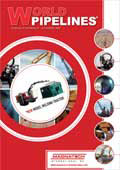Editorial comment
The pipeline world will meet once again in Rio de Janeiro, Brazil, at the Rio Pipeline 2009 Conference and Exposition (22 - 24th September).
Register for free »
Get started now for absolutely FREE, no credit card required.
The pipeline world will meet once again in Rio de Janeiro, Brazil, at the Rio Pipeline 2009 Conference and Exposition (22 - 24th September). A result of the joint work of IBP - The Brazilian Petroleum, Natural Gas and Biofuels Institute - and the Pipeline Systems Division of ASME, the Rio Pipeline Conference is now a world class event, taking place in alternate years to the International Pipeline Conference in Calgary.
The Conference in 2009 will include 330 technical papers from 24 countries and should attract close to the 1400 delegates that attended in 2007. Organised into 13 themes, the technical sessions and panels will cover areas such as new construction and assembly techniques, developments in materials, subsea, ethanol and slurry pipelines, as well as the other usual pipeline issues. The complete programme can be seen at www.riopipeline.com. br. A panel on the future of the pipeline industry will bring senior executives from major operators from each continent to present their views. At the attached Exposition, more than 100 companies will be exhibiting to a public that is set to surpass the 3200 visitants of the last edition.
All those attending Rio Pipeline 2009 will be visiting Brazil in a very special moment. The Brazilian oil and gas industry is entering a new era, with the massive sub-salt deepwater discoveries generating huge expectations about its potential role as major energy player in the future.
Brazil has significant experience with offshore and onshore pipelines. Current offshore flexible and rigid lines add up to some 9000 km. Petrobras has developed leading technology for production at water depths of 2000 m and continuous R&D investment in subsea risers and pipelines will soon allow production in water depths up to 3000 m.
Onshore, Brazil’s sheer size demands extensive transport infrastructure with cost-effective solutions such as pipelines to improve the country’s competitiveness in the export of commodities such as ethanol and ore. At the same time, the fast growth of natural gas use is demanding a significant expansion of both the transmission and distribution pipelines. In addition, huge investments are being made to reposition the existing network away from densely populated areas.
But the current expansion programme will not be sufficient. Even without taking into account the new presalt discoveries, Petrobras oil and gas production in Brazil will grow from 2.5 million boepd at the end of 2009 to some 3.3 million boepd in 2013.
Biofuels will be a major export product for Brazil. Producing around 27 billion litres today, by 2015 the Brazilian production should reach 45 billion litres with exports close to 12 billion litres. Petrobras has over 30 years of unique experience in moving ethanol through its multi-product pipelines but, in order to cope with this expansion in production, Petrobras, its partners and other companies are planning the construction of dedicated ethanol pipelines linking the production areas in the centre of Brazil to the terminals in the coast.
It is easy to imagine the challenges this significant expansion will present for the Brazilian pipeline industry. But we have already committed to overcome them. A multi-billion dollar investment programme is already underway and will certainly accelerate with the new scenario facing Brazil’s oil and gas and biofuels industries.
Brazil offers great opportunities to the pipeline industry. The size of the country and its diversified economy give Brazil a clear advantage. Together with the opportunities offered by the pipeline industry, they make Brazil a market not to be overlooked. And there will be no better place to see this than Rio Pipeline 2009, where the industry will meet to discuss its future.

